 Libri di Latour Bruno su Unilibro.it
)
Libri di Latour Bruno su Unilibro.it
)
|
|
1911 |
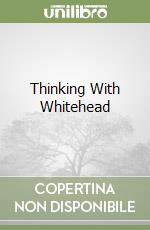 Title :
Thinking With Whitehead
Title :
Thinking With WhiteheadAuthor: Stengers Isabelle, Chase Michael (TRN), Latour Bruno (FRW) Publisher: Harvard Univ Pr € 56,40
|
|
|
2011 |
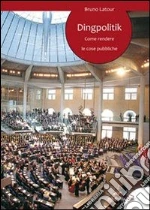 Title :
Dingpolitik. Come rendere le cose pubbliche
Title :
Dingpolitik. Come rendere le cose pubblicheAuthor: Latour Bruno Publisher: Postmedia Books Uno dei più famosi teorici della sociologia contemporanea conia il neologismo 'Dingpolitik' (in opposizione a 'Realpolitik') indicando così una serie di esperimenti che sondano cosa potrebbe significare per il pensiero politico invertire le 'cose' diventando più realistico di quanto sia stato finora. 'Dingpolitik' analizza la politica e lo spazio pubblico e suggerisce che forse abbiamo bisogno di uno spostamento verso la politica delle cose, al fine di ottenere una nuova mappatura della politica. Nel corso della storia la politica è rimasta in silenzio quando si tratta di capire qual è il problema, limitandosi a descrivere il come o a studiare procedure per sviare la domanda, continuando a stabilire differenze piuttosto che sperimentare modelli di convivenza, nuovi modelli di aggregazione e assemblee che non si fondino sui vecchi modelli politici ma tengano conto di un nuovo assemblamento del sociale. € 9,00
Scontato: € 8,55
|
|
|
1910 |
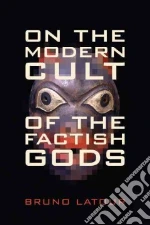 Title :
On the Modern Cult of the Factish Gods
Title :
On the Modern Cult of the Factish GodsAuthor: Latour Bruno Publisher: Duke Univ Pr On the Modern Cult of the Factish Gods continues the project that the influential anthropologist, philosopher, and science studies theorist Bruno Latour advanced in his book We Have Never Been Modern. There he redescribed the Enlightenment idea of universal scientific truth, arguing that there are no facts separable from their fabrication. In this concise work, Latour delves into the 'belief in naive belief,' the suggestion that fetishes, objects invested with mythical powers, are fabricated, and that 'facts' are not. Mobilizing his work in the anthropology of science, he uses the notion of 'factishes' to explore a way of respecting the objectivity of facts and the power of fetishes without forgetting that both are fabricated. While the fetish-worshipper knows perfectly well that fetishes are man-made, the Modern icon-breaker inevitably erects new icons. Yet Moderns sense no contradiction at the core of their work. Latour pursues his critique of critique, or the possibility of mediating between subject and object, or the fabricated and the real, through the notion of 'iconoclash,' making productive comparisons between scientific practice and the worship of visual images and religious icons. 'What immense spiritual and intellectual relaxation! With what vivacity and cunning Bruno Latour gets us out of the cage holding us hostage to the mumbo-jumbo of Subjects and Objects all these long years of Western Civ. Out-fetishizing these fetishes, nudging us towards the mastery of non-mastery, he invites us thereby to the sort of thinking needed to remake a failing world.'---Michael Taussig, Columbia University 'Bruno Latour's is a joyous and generous science, not a warmongering, invidious one. His unique intellectual trajectory beautifully replicates those strange objects he was the first to fully discern. For his work is eminently suitable to an actor-network treatment; it thrives on associations; it deals in mediations; it articulates heterogeneous modes of existence; it modulates its own regime of enunciation as the truth it describes changes its own conditions of production. What started as a `social description of scientific practice' morphed into a radical redescription of the social at least as much as of science itself, and it bloomed as a daring project of a general anthropology of truth, within which facts and fetishes, divine forces and material forms, art and science, religion and law, all are made to inhabit a virtual plane of coexistence, which we are challengingly invited to bring into actuality as our common world.'---Eduardo Viveiros De Castro, Museu Nacional (Rio de Janeiro) € 21,50
|
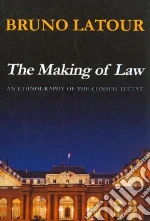 Title :
The Making of Law
Title :
The Making of LawAuthor: Latour Bruno Publisher: Polity Pr In this book, Bruno Latour pursues his ethnographic inquiries into the different value systems of modern societies. After science, technology, religion, art, it is now law that is being studied by using the same comparative ethnographic methods. The case study is the daily practice of one of the French supreme court, the Conseil d'Etat, specialized in administrative law (the equivalent of the Law Lords in Great Britain). Even though the French legal system is vastly different from the Anglo-American tradition, it just happens that this branch of French law, although created by Napoleon Bonaparte at the same time as the Code-based system, is the result of a home grown tradition constructed on precedents. Thus, even though highly technical, the cases that forms the matter of this book, are not so exotic for an English speaking audience. What makes this study an important contribution to the social studies of law is that, because of an unprecedented access to the collective discussions of judges, Latour has been able to reconstruct in details the weaving of legal reasoning : it is clearly not the social that explains the law, but the legal ties that alter what it is to be associated together. It is thus a major contribution to Latour's social theory since it is now possible to compare the ways legal ties build up associations with the other types of connections that he has studied in other fields of acticity. His project of an alternative interpretation of the very notion of society has never been made clearer than in this work. To reuse the title of his first book, this book is in effect the Laboratory Life of Law. € 29,00
|
|
2009 |
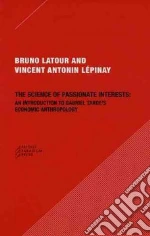 Title :
The Science of Passionate Interests
Title :
The Science of Passionate InterestsAuthor: Latour Bruno, Lepinay Vincent Antonin Publisher: Prickly Paradigm How can economics become genuinely quantitative? This is the question that French sociologist Gabriel Tarde tackled at the end of his career, and in this pamphlet, Bruno Latour and Vincent Antonin Lépinay offer a lively introduction to the work of the forgotten genius of nineteenth-century social thought. Tarde's solution was in total contradiction to the dominant views of his time: to quantify the connections between people and goods, you need to grasp “passionate interests.” In Tarde's view, capitalism is not a system of cold calculations—rather it is a constant amplification in the intensity and reach of passions. In a stunning anticipation of contemporary economic anthropology, Tarde's work defines an alternative path beyond the two illusions responsible for so much modern misery: the adepts of the Invisible Hand and the devotees of the Visible Hand will learn how to escape the sterility of their fight and recognize the originality of a thinker for whom everything is intersubjective, hence quantifiable. At a time when the regulation of financial markets is the subject of heated debate, Latour and Lépinay provide a valuable historical perspective on the fundamental nature of capitalism. € 11,60
|
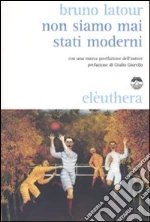 Title :
Non siamo mai stati moderni
Title :
Non siamo mai stati moderniAuthor: Latour Bruno Publisher: Eleuthera Embrioni congelati, fiumi inquinati, virus dell'AIDS, buco dell'ozono... Questi strani 'oggetti' appartengono alla natura o alla cultura? La tradizionale divisione dei compiti tra scienze naturali e discipline sociali diventa sempre meno capace di rendere conto della proliferazione degli 'ibridi'. Ne deriva un senso di angoscia che i filosofi contemporanei, post-moderni, moderni, o antimoderni che siano, non riescono a placare. In realtà i 'moderni' non hanno mai smesso di creare oggetti 'ibridi', che attingono all'uno o alll'atro ambito contemporaneamente, e si rifiutano di prenderli in considerazione in quanto tali, cioè in quanto ibridi natural-culturali. Non siamo dunque mai stati moderni. E' quel paradigma fondatore che bisogna rimettere in discussione. € 16,00
|
|
2008 |
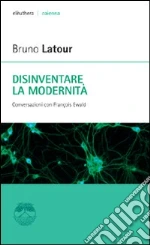 Title :
Disinventare la modernità. Conversazioni con François Ewald
Title :
Disinventare la modernità. Conversazioni con François EwaldAuthor: Latour Bruno; Ewald François Publisher: Eleuthera I politici snocciolano sempre più spesso presunti 'dati scientifici' nei loro discorsi. Conservatori o progressisti che siano, tutti si affannano ad assicurarsi il sostegno di qualche 'dato certo', fornito da 'esperti', per le loro opinioni e per le loro decisioni. Come se vi fossero certezze sui fatti e univocità di interpretazioni. Le scoperte scientifiche e le innovazioni tecnologiche hanno contribuito a creare il mondo moderno. L'hanno reso più vivibile e confortevole. Ma nessun esperto, nessuno scienziato può controllare e prevedere ogni cosa. E gli 'effetti collaterali' dello sviluppo si moltiplicano e amplificano. Che fare? Che fare se l'intreccio di fatti e valori sembra destinato a riproporsi, a dispetto del progresso e della modernità, e diversi sistemi di valori si affrontano? In queste brevi conversazioni Latour delinea una risposta forte. Bisogna 'disinventare' la modernità e costruire spazi di mediazione, di negoziazione fra diverse culture, saperi e tradizioni. Solo attraverso l'idea di un mondo comune è possibile comprenderne la pluralità. € 8,00
|
|
|
2005 |
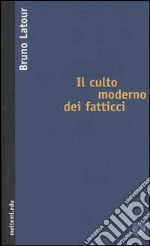 Title :
Il culto moderno dei fatticci
Title :
Il culto moderno dei fatticciAuthor: Latour Bruno; Pacciolla C. (cur.) Publisher: Meltemi La parola 'feticcio' e la parola 'fatto' hanno la stessa etimologia ambigua. La parola 'fatto' rinvia però alla realtà esterna, la parola 'feticcio' alle credenze del soggetto. Incalzati dalla necessità di tenere distinto il soggetto dall'oggetto e dunque la conoscenza dalla credenza, secondo Bruno Latour, hanno tentato d'istituire un vero e proprio processo al feticcio. Ma ora è arrivato il momento di smetterla di distinguere i feticci dai fatti, la conoscenza dalla credenza, il soggetto dall'oggetto, unendo le due fonti etimologiche nel 'fatticcio', cioè la certezza che permette alla pratica di passare all'azione senza mai credere alla differenza tra immanenza e trascendenza. € 13,00
|
 Title :
Making Things Public
Title :
Making Things PublicAuthor: Latour Bruno (EDT), Weibel Peter (EDT) Publisher: Mit Pr In this groundbreaking editorial and curatorial project, more than 100 writers, artists, and philosophers rethink what politics is about. In a time of political turmoil and anticlimax, this book redefines politics as operating in the realm of things. Politics is not just an arena, a profession, or a system, but a concern for things brought to the attention of the fluid and expansive constituency of the public. But how are things made public? What, we might ask, is a republic, a res publica, a public thing, if we do not know how to make things public? There are many other kinds of assemblies, which are not political in the usual sense, that gather a public around things—scientific laboratories, supermarkets, churches, and disputes involving natural resources like rivers, landscapes, and air. The authors of Making Things Public—and the ZKM show that the book accompanies—ask what would happen if politics revolved around disputed things. Instead of looking for democracy only in the official sphere of professional politics, they examine the new atmospheric conditions—technologies, interfaces, platforms, networks, and mediations that allow things to be made public. They show us that the old definition of politics is too narrow; there are many techniques of representation—in politics, science, and art—of which Parliaments and Congresses are only a part. The authors include such prominent thinkers as Richard Rorty, Simon Schaffer, Peter Galison, Richard Powers, Lorraine Daston, Richard Aczel, and Donna Haraway; their writings are accompanied by excerpts from John Dewey, Shakespeare, Swift, La Fontaine, and Melville. More than 500 color images document the new idea of what Bruno Latour and Peter Weibel call an "object-oriented democracy." € 49,50
|
|
2004 |
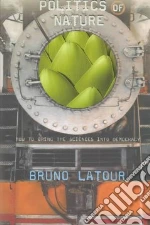 Title :
Politics of Nature
Title :
Politics of NatureAuthor: Latour Bruno, Porter Catherine (TRN) Publisher: Harvard Univ Pr A major work by one of the more innovative thinkers of our time, Politics of Nature does nothing less than establish the conceptual context for political ecology--transplanting the terms of ecology into more fertile philosophical soil than its proponents have thus far envisioned. Bruno Latour announces his project dramatically: 'Political ecology has nothing whatsoever to do with nature, this jumble of Greek philosophy, French Cartesianism and American parks.' Nature, he asserts, far from being an obvious domain of reality, is a way of assembling political order without due process. Thus, his book proposes an end to the old dichotomy between nature and society--and the constitution, in its place, of a collective, a community incorporating humans and nonhumans and building on the experiences of the sciences as they are actually practiced. In a critique of the distinction between fact and value, Latour suggests a redescription of the type of political philosophy implicated in such a 'commonsense' division--which here reveals itself as distinctly uncommonsensical and in fact fatal to democracy and to a healthy development of the sciences. Moving beyond the modernist institutions of 'mononaturalism' and 'multiculturalism,' Latour develops the idea of 'multinaturalism,' a complex collectivity determined not by outside experts claiming absolute reason but by 'diplomats' who are flexible and open to experimentation. € 42,50
|
|
|
2000 |
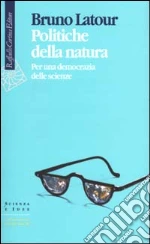 Title :
Politiche della natura. Per una democrazia delle scienze
Title :
Politiche della natura. Per una democrazia delle scienzeAuthor: Latour Bruno Publisher: Raffaello Cortina Editore Come riempire il divario apparentemente incolmabile che separa la scienza (incaricata di comprendere la natura) e la politica (che ha il compito di regolare la vita sociale)? Come colmare un divario le cui conseguenze ('scandalo' dell'amianto, sangue infetto, mucca pazza...) diventano sempre più catastrofiche? Latour propone un modo di considerare l'ecologia politica che, secondo l'autore, passa attraverso una profonda ridefinizione del ruolo dell'attività scientifica e di quella politica. Il volume è destinato a tutti coloro che si interessano di ecologia, di dibattito scientifico e, più in generale, a quanti ritengono che la questione della democrazia riguardi in prima istanza anche le scienze. € 26,00
|
|
|
1999 |
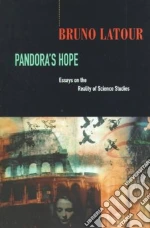 Title :
Pandora's Hope
Title :
Pandora's HopeAuthor: Latour Bruno Publisher: Harvard Univ Pr A scientist friend asked Bruno Latour point-blank: 'Do you believe in reality?' Taken aback by this strange query, Latour offers his meticulous response in Pandora's Hope. It is a remarkable argument for understanding the reality of science in practical terms. In this book Latour, identified by Richard Rorty as the new 'bête noire of the science worshipers,' gives us his most philosophically informed book since Science in Action. Through case studies of scientists in the Amazon analyzing soil and in Pasteur's lab studying the fermentation of lactic acid, he shows us the myriad steps by which events in the material world are transformed into items of scientific knowledge. Through many examples in the world of technology, we see how the material and human worlds come together and are reciprocally transformed in this process. Why, Latour asks, did the idea of an independent reality, free of human interaction, emerge in the first place? His answer to this question, harking back to the debates between Might and Right narrated by Plato, points to the real stakes in the so-called science wars: the perplexed submission of ordinary people before the warring forces of claimants to the ultimate truth. € 39,30
|
|
|
1996 |
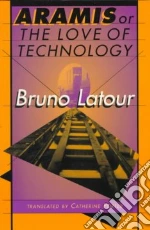 Title :
Aramis or the Love of Technology
Title :
Aramis or the Love of TechnologyAuthor: Latour Bruno, Porter Catherine (TRN) Publisher: Harvard Univ Pr A guided-transportation system intended for Paris, Aramis represented a major advance in personal rapid transit: it combined the efficiency of a subway with the flexibility of an automobile. But in the end, its electronic couplings proved too complex and expensive, the political will failed, and the project died in 1987. The story of Aramis is told by several different parties, none of which take precedence over any other: a young engineer and his professor, who act as detective to ferret out the reasons for the project's failure; company executives and elected officials; a sociologist; and finally Aramis itself, who delivers a passionate plea: technological innovation has needs and desires, especially a desire to be born, but cannot live without the sustained commitment of those who have created it. € 40,40
|
|
|
1995 |
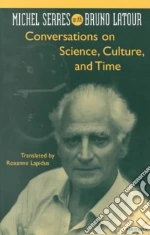 Title :
Conversations on Science, Culture, and Time
Title :
Conversations on Science, Culture, and TimeAuthor: Serres Michel, Latour Bruno, Lapidus Roxanne (TRN) Publisher: Univ of Michigan Pr Although elected to the prestigious French Academy in 1990, Michel Serres has long been considered a maverick--a provocative thinker whose prolific writings on culture, science and philosophy have often baffled more than they have enlightened. In these five lively interviews with sociologist Bruno Latour, this increasingly important cultural figure sheds light on the ideas that inspire his highly original, challenging, and transdisciplinary essays. Serres begins by discussing the intellectual context and historical events-- including the impact of World War II and Hiroshima, which for him marked the beginning of science's ascendancy over the humanities--that shaped his own philosophical outlook and led him to his lifelong mission of bringing together the texts of the humanities and the conceptual revolutions of modern science. He then confronts the major difficulties encountered by his readers: his methodology, his mathematician's fondness for 'shortcuts' in argument, and his criteria for juxtaposing disparate elements from different epochs and cultures in extraordinary combinations. Finally, he discusses his ethic for the modern age--a time when scientific advances have replaced the natural necessities of disease and disaster with humankind's frightening new responsibility for vital things formerly beyond its control. In the course of these conversations Serres revisits and illuminates many of his themes: the chaotic nature of knowledge, the need for connections between science and the humanities, the futility of traditional criticism, and what he calls his 'philosophy of prepositions'--an argument for considering prepositions, rather than the conventionally emphasized verbs and substantives, as the linguistic keys to understanding human interactions. For readers familiar with Serres's works as well as for the uninitiated, Conversations on a Life in Philosophy provides fascinating insights into the mind of this appealing, innovative and ardent thinker. Michel Serres has taught at Clermont-Ferrand, at the University of Paris VIII (Vincennes) and at the Sorbonne. He has served as visiting professor at Johns Hopkins University and has been on the faculty of Stanford University since 1984. Bruno Latour, a philosopher and anthropologist, is Professor of Sociology, L'Ecole Nationale Supérieure des Mines in Paris. He has written several books and numerous articles on the ties between the sciences and the rest of culture and society. Roxanne Lapidus is Managing Editor of SubStance: A Review of Theory and Literary Criticism. Conversations on a Life in Philosophy was originally published in France as Eclaircissements. € 26,60
|
|
|
1993 |
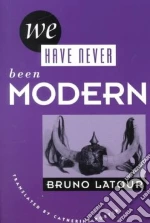 Title :
We Have Never Been Modern
Title :
We Have Never Been ModernAuthor: Latour Bruno, Porter Catherine (TRN) Publisher: Harvard Univ Pr With the rise of science, we moderns believe, the world changed irrevocably, separating us forever from our primitive, premodern ancestors. But if we were to let go of this fond conviction, Bruno Latour asks, what would the world look like? His book, an anthropology of science, shows us how much of modernity is actually a matter of faith. What does it mean to be modern? What difference does the scientific method make? The difference, Latour explains, is in our careful distinctions between nature and society, between human and thing, distinctions that our benighted ancestors, in their world of alchemy, astrology, and phrenology, never made. But alongside this purifying practice that defines modernity, there exists another seemingly contrary one: the construction of systems that mix politics, science, technology, and nature. The ozone debate is such a hybrid, in Latour's analysis, as are global warming, deforestation, even the idea of black holes. As these hybrids proliferate, the prospect of keeping nature and culture in their separate mental chambers becomes overwhelming--and rather than try, Latour suggests, we should rethink our distinctions, rethink the definition and constitution of modernity itself. His book offers a new explanation of science that finally recognizes the connections between nature and culture--and so, between our culture and others, past and present. Nothing short of a reworking of our mental landscape. We Have Never Been Modern blurs the boundaries among science, the humanities, and the social sciences to enhance understanding on all sides. A summation of the work of one of the most influential and provocative interpreters of science, it aims at saving what is good and valuable in modernity and replacing the rest with a broader, fairer, and finer sense of possibility. € 35,10
|
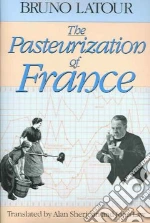 Title :
The Pasteurization of France
Title :
The Pasteurization of FranceAuthor: Latour Bruno Publisher: Harvard Univ Pr What can one man accomplish, even a great man and brilliant scientist? Although every town in France has a street named for Pasteur, was he alone able to stop people from spitting, persuade them to dig drains, influence them to undergo vaccination? Pasteur's success depended upon a whole network of forces, including the public hygiene movement, the medical profession (both military physicians and private practitioners), and colonial interests. It is the operation of these forces, in combination with the talent of Pasteur, that Bruno Latour sets before us as a prime example of science in action. Latour argues that the triumph of the biologist and his methodology must be understood within the particular historical convergence of competing social forces and conflicting interests. Yet Pasteur was not the only scientist working on the relationships of microbes and disease. How was he able to galvanize the other forces to support his own research? Latour shows Pasteur's efforts to win over the French public--the farmers, industrialists, politicians, and much of the scientific establishment. Instead of reducing science to a given social environment, Latour tries to show the simultaneous building of a society and its scientific facts. The first section of the book, which retells the story of Pasteur, is a vivid description of an approach to science whose theoretical implications go far beyond a particular case study. In the second part of the book, 'Irreductions,' Latour sets out his notion of the dynamics of conflict and interaction, of the 'relation of forces.' Latour's method of analysis cuts across and through the boundaries of the established disciplines of sociology, history, and the philosophy of science, to reveal how it is possible not to make the distinction between reason and force. Instead of leading to sociological reductionism, this method leads to an unexpected irreductionism. € 48,90
|
|
1991 |
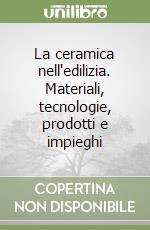 Title :
La ceramica nell'edilizia. Materiali, tecnologie, prodotti e impieghi
Title :
La ceramica nell'edilizia. Materiali, tecnologie, prodotti e impieghiAuthor: Fabbri Bruno; Latour Giovanna; Micocci Ferruccio Publisher: Carocci € 25,30
|
|
|
1986 |
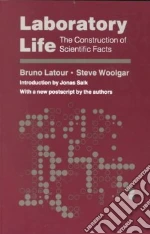 Title :
Laboratory Life
Title :
Laboratory LifeAuthor: Bruno Latour Publisher: UNIVERSITY PRESSES This highly original work presents laboratory science in a deliberately skeptical way: as an anthropological approach to the culture of the scientist. Drawing on recent work in literary criticism, the authors study how the social world of the laboratory produces papers and other 'texts,'' and how the scientific vision of reality becomes that set of statements considered, for the time being, too expensive to change. The book is based on field work done by Bruno Latour in Roger Guillemin's laboratory at the Salk Institute and provides an important link between the sociology of modern sciences and laboratory studies in the history of science. € 35,90
|

|

|

|